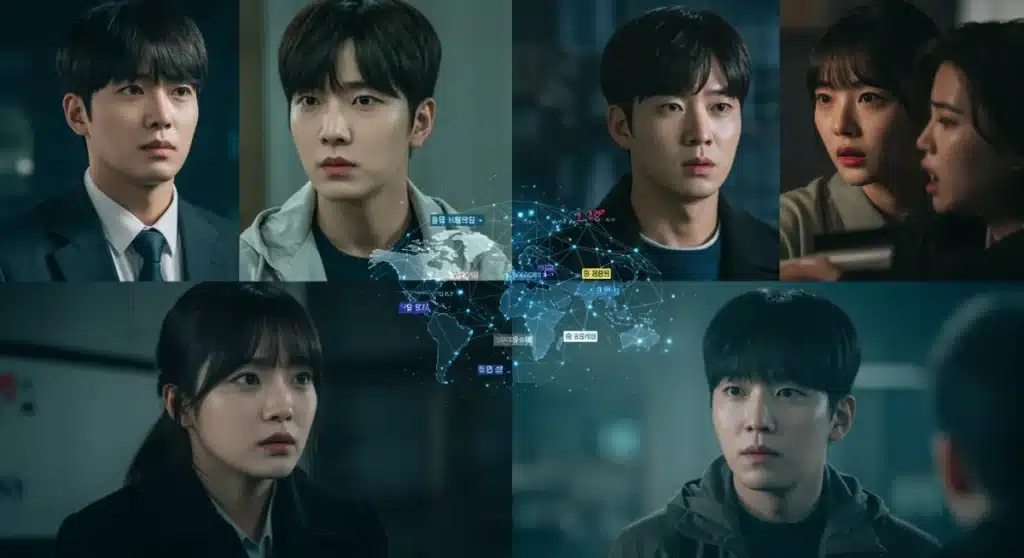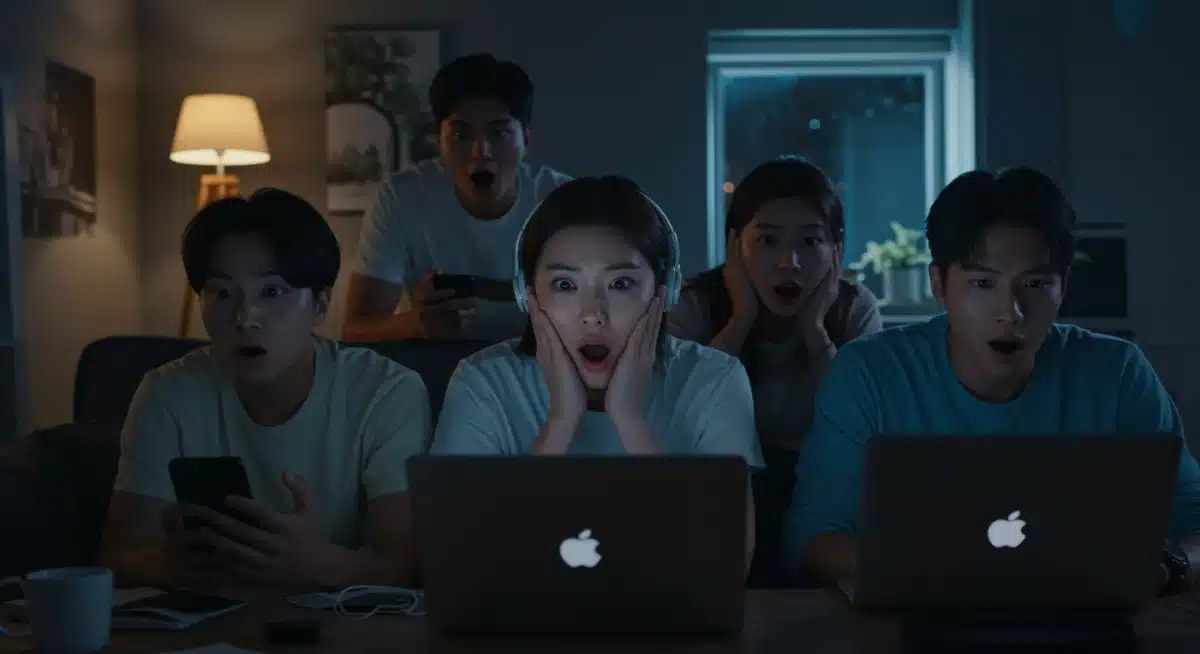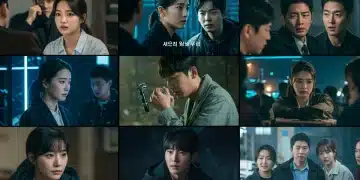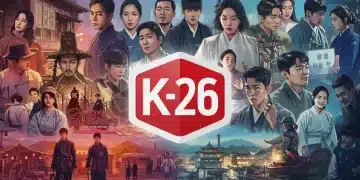K-Drama Endings 2024: Top 5 Shockers for U.S. Viewers

The top 5 K-drama endings of 2024 generated unprecedented controversy among U.S. viewers, sparking widespread online debates for over three months due to their unexpected and often ambiguous resolutions.
In 2024, the world of Korean dramas continued its global ascent, captivating millions of viewers, especially in the United States. However, some series transcended mere popularity, concluding with finales so polarizing that they ignited a firestorm of discussion. These were not just plot twists; these were narrative seismic shifts that had U.S. viewers glued to their screens, then immediately flocking to social media. The Top 5 K-Drama Endings of 2024 That Shocked U.S. Viewers and Sparked 3 Months of Online Debate became a cultural phenomenon, redefining expectations and demonstrating the profound impact these stories have on their audience.
The evolving landscape of K-drama narratives and audience expectations
K-dramas have long been praised for their intricate storytelling, compelling character development, and often picturesque cinematography. However, 2024 marked a significant shift, particularly in how narratives concluded. Gone are the days when every K-drama was expected to end with a clear, unequivocally happy resolution. Modern audiences, especially in the U.S., have grown sophisticated, craving complexity and realism, even if it means confronting uncomfortable truths or ambiguous futures for their beloved characters.
This evolving taste has pushed creators to experiment, leading to endings that challenge conventional tropes. The result is a richer, more diverse storytelling landscape, but also one that carries the risk of alienating or, conversely, deeply engaging its audience. The debates surrounding the 2024 finales are a testament to this delicate balance between artistic vision and viewer satisfaction.
The rise of ambiguous and open-ended finales
One of the most notable trends in 2024 was the increased prevalence of ambiguous or open-ended finales. These endings often leave critical plot points unresolved, forcing viewers to piece together their own conclusions or speculate on the characters’ fates. While some find this liberating and thought-provoking, others find it deeply frustrating, feeling a lack of closure.
- Creative freedom: Allows writers to explore more complex themes without being constrained by traditional happy endings.
- Viewer engagement: Encourages fan theories and post-series discussions, extending the life of the drama.
- Frustration for some: Can leave viewers feeling unfulfilled, especially after investing significant emotional energy.
- Reflecting reality: Acknowledges that life often doesn’t offer neat, tidy conclusions.
The shift towards these types of endings reflects a broader artistic movement within Korean television, moving away from purely escapist fantasies towards narratives that provoke thought and discussion. This trend has been particularly well-received by international audiences who appreciate storytelling that mirrors the complexities of real life.
Ultimately, the impact of these narrative choices on U.S. viewers highlights a growing appreciation for K-dramas as a serious form of artistic expression, capable of evoking strong emotions and extensive critical discourse.
‘Crimson Tide’: a tragic love story’s divisive conclusion
‘Crimson Tide’ was one of 2024’s most anticipated K-dramas, lauded for its stunning visuals and the intense chemistry between its leads. The story followed two star-crossed lovers from warring factions, destined to meet a tragic end. Viewers were emotionally invested, hoping for a miracle that would defy their fated separation. However, the finale delivered on its promise of tragedy, leaving many U.S. fans heartbroken and furious.
The ending saw both protagonists sacrificing themselves for a greater cause, a noble but devastating conclusion that offered no reprieve for their love story. Social media platforms immediately erupted, with hashtags like #CrimsonTideJustice and #WhereIsMyHappyEnding trending for weeks. Fans expressed deep disappointment, feeling that the characters deserved a chance at happiness after enduring so much suffering.
The debate over realism versus fantasy in K-dramas
The ‘Crimson Tide’ ending sparked a significant debate about the balance between realism and fantasy in K-dramas. Many viewers argued that while tragic endings can be impactful, they felt betrayed by a narrative that hinted at hope only to snatch it away. Others defended the writers’ choice, stating that it aligned with the drama’s overarching themes of sacrifice and the futility of war.
- Emotional investment: Viewers felt a strong connection to the characters, making the tragic ending particularly painful.
- Narrative consistency: Some argued the ending was consistent with the drama’s dark tone from the beginning.
- Escapism vs. reality: The debate highlighted whether K-dramas should primarily offer escapism or reflect harsh realities.
- Fan expectations: Many U.S. fans, accustomed to more definitive happy endings, struggled with the ultimate sacrifice.
The discussion extended beyond just ‘Crimson Tide,’ prompting a broader conversation within the K-drama community about the responsibility of creators to their audience’s emotional well-being versus their artistic independence. This particular ending showcased how deeply U.S. audiences connect with K-drama characters, treating their fictional journeys with genuine emotional gravity.
‘The Quantum Leap’: a time-travel paradox that baffled everyone
‘The Quantum Leap’ promised an exhilarating journey through time, full of intricate paradoxes and mind-bending twists. For its first 14 episodes, it delivered spectacularly, weaving a complex web of cause and effect that kept viewers on the edge of their seats. The finale, however, introduced a paradox so convoluted that it left even the most dedicated fans scratching their heads in confusion. Instead of resolving the central mystery, it presented a new, seemingly unsolvable temporal loop.
U.S. viewers, who often appreciate narratives with clear resolutions, found themselves utterly bewildered. Online forums became a hotbed of theories, diagrams, and desperate attempts to make sense of the final scenes. The confusion wasn’t just about interpretation; it was about whether the ending actually made logical sense within the established rules of the drama’s universe. Many felt it was a cop-out, an attempt at cleverness that ultimately undermined the entire series.


The search for meaning in narrative ambiguity
The ending of ‘The Quantum Leap’ perfectly encapsulated the dilemma of narrative ambiguity. While some praised its bold, experimental nature, arguing that it invited deeper philosophical contemplation about time and destiny, the majority of U.S. viewers craved clarity. The frustration stemmed from the feeling that the writers had deliberately withheld information or created an unresolvable puzzle, rather than offering a satisfying conclusion.
- Plot holes vs. artistic choice: Debates centered on whether the ending was a genuine plot hole or a deliberate artistic statement.
- Fan theories explosion: The ambiguity led to an unprecedented volume of fan theories attempting to explain the unexplainable.
- Rewatch value: Some viewers found new appreciation for the series on rewatch, searching for hidden clues.
- Demands for explanation: Many fans called for the showrunners to release an official explanation or a special episode.
This particular finale highlighted the importance of clear world-building, even in complex genres like time-travel. When the established rules of a fictional universe are seemingly broken or left too open-ended, it can lead to frustration rather than engagement, particularly for an audience that values narrative coherence.
‘Whispers of the Crown’: an anti-climactic villain reveal
‘Whispers of the Crown’ was a political thriller that promised a grand reveal of its mastermind villain, a shadowy figure manipulating events from behind the scenes. The build-up was masterful, with red herrings and intricate conspiracies keeping viewers guessing for weeks. The expectation was for a shocking, powerful antagonist to emerge, someone whose reveal would tie all the loose ends together in a satisfying, dramatic fashion.
Instead, the finale unveiled the villain to be a relatively minor character, someone who had barely appeared throughout the series and whose motivations felt underdeveloped and unconvincing. U.S. audiences reacted with a collective sigh of disappointment. The anti-climax was palpable, and many felt that the payoff simply wasn’t worth the immense build-up. The reveal felt less like a twist and more like a letdown.
The impact of a weak antagonist on overall series satisfaction
The disappointment surrounding ‘Whispers of the Crown’s’ ending underscored how crucial a compelling antagonist is to the success of a thriller. When the villain lacks depth or presence, the entire narrative can feel deflated. For U.S. viewers, who are accustomed to complex and memorable antagonists in their thrillers, this felt like a missed opportunity.
- Narrative weight: A strong villain provides essential narrative weight and drives the plot forward.
- Viewer engagement: A compelling antagonist keeps viewers invested in the hero’s struggle.
- Sense of resolution: A satisfying defeat of a formidable foe brings a greater sense of closure.
- Character development: The villain’s motivations often reflect or challenge the protagonist’s own journey.
The debate around this ending focused on whether the writers had simply run out of ideas or if they had deliberately tried to subvert expectations in a way that ultimately backfired. It served as a stark reminder that sometimes, a straightforward, impactful reveal is more effective than an attempt at a twist that falls flat.
‘Echoes of Destiny’: a sudden, unexplained character death
‘Echoes of Destiny’ was a heartwarming slice-of-life drama centered around a close-knit group of friends navigating their early twenties. It was celebrated for its realistic portrayal of friendship, love, and the struggles of adulthood. Viewers had grown incredibly attached to the characters, especially the vibrant and optimistic protagonist, whose journey was the emotional core of the series.
The finale delivered a shocking blow: the sudden, unexpected death of this beloved protagonist in an accident that felt completely out of left field and served no clear narrative purpose. There was no foreshadowing, no thematic resonance; it simply happened. U.S. viewers were not only heartbroken but also confused and angry. Many felt it was a cheap way to inject tragedy, undermining the entire positive message of the drama.
The ethics of character deaths in storytelling
The ending of ‘Echoes of Destiny’ ignited a passionate debate about the ethics of character deaths in storytelling. While death can be a powerful narrative tool, its arbitrary use can feel manipulative and disrespectful to both characters and viewers. For U.S. audiences, who had formed strong emotional bonds with the protagonist, this felt like a betrayal.
- Emotional impact: Unjustified character deaths can deeply upset and alienate viewers.
- Narrative purpose: Deaths should serve a clear purpose, advancing the plot or character development.
- Foreshadowing: Proper foreshadowing can make even tragic deaths feel earned and meaningful.
- Viewer trust: Breaking viewer trust through arbitrary plot devices can damage a drama’s reputation.
The online discussions questioned whether the writers had considered the emotional toll on their audience, particularly those who relied on the drama for comfort and inspiration. This finale demonstrated that while K-dramas can explore difficult themes, the manner in which they do so significantly impacts audience reception and overall satisfaction.
‘Moonlit Serenade’: a rushed and unsatisfying conclusion
‘Moonlit Serenade’ was a sprawling historical romance, rich with political intrigue, family feuds, and a slow-burn love story that captivated audiences. Over 16 episodes, it meticulously built up its world and characters, promising a grand, satisfying resolution to its many interwoven plotlines. The chemistry between the leads was undeniable, and fans eagerly anticipated their eventual union and the triumph of justice.
However, the final episode felt incredibly rushed. Major plot points were resolved with lightning speed, often off-screen or with minimal explanation. Character arcs that had been carefully developed over weeks were abruptly concluded, and the much-anticipated romantic reunion felt hollow due to the hasty pacing. U.S. viewers felt shortchanged, as if the writers had run out of time or ideas and simply crammed everything into the last hour.
The pitfalls of pacing in K-drama finales
The ‘Moonlit Serenade’ ending highlighted a common pitfall in K-drama production: the challenge of maintaining consistent pacing, especially in the final episodes. A rushed conclusion can undo weeks of careful storytelling, leaving viewers feeling unsatisfied and questioning the overall quality of the series. For an audience that values well-crafted narratives, this was a significant letdown.
- Unresolved plotlines: Rushed endings often leave crucial subplots feeling incomplete or ignored.
- Character development: Abrupt conclusions can undermine the growth and journeys of key characters.
- Emotional payoff: A hurried pace diminishes the emotional impact of significant moments, including romantic unions.
- Production constraints: Sometimes, external factors like live shooting schedules contribute to rushed finales.
The debate around ‘Moonlit Serenade’ wasn’t about the content of the ending itself, but about its execution. It underscored the importance of pacing and careful narrative construction, particularly in the climactic moments of a series, to ensure that the audience’s investment is rewarded with a truly fulfilling conclusion.
The lasting impact of controversial K-drama endings on U.S. fandom
The collective shock and subsequent three-month debate surrounding these K-drama endings of 2024 reveal several key insights into the U.S. K-drama fandom. Firstly, it demonstrates the immense emotional investment viewers place in these stories and characters. K-dramas are no longer just a niche interest; they are a significant part of popular culture, capable of generating widespread, passionate discussion.
Secondly, these controversies have raised the bar for future K-drama productions. Viewers are actively engaging with the narratives, critiquing their strengths and weaknesses, and openly discussing their expectations. This feedback, amplified through social media, provides valuable insights for creators, pushing them to strive for even higher standards of storytelling and resolution.
The power of online communities in shaping K-drama discourse
Online platforms like Reddit, X (formerly Twitter), and various K-drama fan sites played a crucial role in amplifying these debates. These communities provided spaces for viewers to share their theories, vent their frustrations, and collectively process their shock. This collective engagement turned individual reactions into a widespread cultural conversation.
- Instantaneous reactions: Social media allows for immediate, global reactions to episode releases.
- Theory crafting: Fans collaborate to decode ambiguous endings and plot twists.
- Community building: Shared reactions foster a sense of belonging among fans.
- Creator feedback: Online discourse can directly influence future production decisions and writing styles.
The intensity and longevity of these discussions highlight the global interconnectedness of fandom. U.S. viewers, through their active participation, are not just passive consumers but active contributors to the ongoing narrative surrounding K-dramas, influencing trends and expectations within the industry itself. This dynamic interaction ensures that the conversation around K-dramas remains vibrant and constantly evolving.
| K-Drama Title | Reason for Shock/Debate |
|---|---|
| Crimson Tide | Tragic double sacrifice, leaving no happy ending for beloved leads. |
| The Quantum Leap | Incomprehensible time-travel paradox, baffling viewers with its ambiguity. |
| Whispers of the Crown | Anti-climactic villain reveal, undermining weeks of suspense and build-up. |
| Echoes of Destiny | Sudden, unjustified death of the beloved protagonist, leaving fans heartbroken. |
Frequently asked questions about K-drama endings
K-drama endings can be controversial due to a mix of high viewer expectations for clear resolutions, artistic choices leaning towards ambiguity, and sometimes production constraints. When viewers are deeply invested, any deviation from their anticipated outcome can lead to intense debate and disappointment.
While many U.S. viewers appreciate happy and definitive endings, there’s a growing segment that also values complex, realistic, or even tragic conclusions. The preference often depends on the genre and the overall tone of the drama, but closure is generally highly valued.
K-drama writers consider various factors, including thematic consistency, character arcs, plot requirements, and audience feedback. Sometimes, live-shooting schedules can influence final decisions, leading to changes based on viewer reactions, though this can also lead to rushed conclusions.
An ambiguous ending leaves key plot points or character fates unresolved, allowing viewers to interpret the conclusion themselves. This can be a deliberate artistic choice to provoke thought or extend discussion, but it can also frustrate audiences seeking clear closure.
Yes, especially in live-shooting systems, fan reactions and online sentiment can sometimes influence the direction of a K-drama, including its ending. However, this is not always the case, and many writers prioritize their original artistic vision regardless of external pressure.
Conclusion
The year 2024 proved to be a landmark year for K-dramas, not just for their global reach, but for the profound impact their finales had on U.S. audiences. From tragic sacrifices to baffling paradoxes, anti-climactic reveals, and sudden character departures, these top five endings ignited months of intense online debate, proving that K-dramas are more than just entertainment; they are cultural touchstones that deeply resonate with their viewers. The discussions highlighted the evolving expectations of a sophisticated audience, pushing creators to explore new narrative territories while also underscoring the importance of delivering satisfying and coherent conclusions. As K-dramas continue to captivate the world, the dialogue between creators and their passionate fandom will undoubtedly shape the future of this dynamic genre, ensuring that each ending, whether shocking or sublime, contributes to a richer storytelling landscape.





